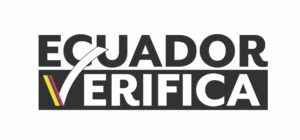The project Ecuador Verifica (Ecuador Verifies), a coalition of 15 media outlets, six nongovernmental organizations and seven universities, was launched Sept. 10 to combat disinformation during Ecuador’s 2021 presidential elections. The election campaign starts this December.
The initiative, according to the organizers, is unprecedented in Ecuador and is inspired by similar initiatives in Latin America, such as Verificado in Mexico and Projeto Comprova in Brazil. For César Ricaurte, executive director of Fundamedios, which is part of the group, disinformation is a complex phenomenon, which can only be tackled by collective efforts, uniting different sectors of society.
“It’s a serious problem that affects democratic institutions not only in Ecuador and Latin America. It’s a global phenomenon. That is why the UN has shown that the fight against disinformation must be one of the priorities in strengthening democracies. The coalition of Ecuador Verifica emerged under this context. It’s a collective to verify information and public discourse in the electoral context,” Ricaurte said at the project’s launch.
According to him, disinformation has unfortunately become a "tool of political struggle" and has the potential to increase violence during the elections in Ecuador.
The project has three principal objectives, according to María Gabriela Alvear, cofounder of the organization Diálogo Diverso, which is also part of the group.

Ecuador Verifica logo
The coalition’s first objective is to identify the networks of disinformation. In addition to detecting fake content, the group will look for the source of the material and inform the public of this through digital channels. The second objective is to verify politicians and candidates’ public discourse in order to disseminate the correct, accurate and relevant information for the electoral debate.
The coalition’s third objective is to promote digital literacy in the country so that citizens have the tools to distinguish what is real and fake on the internet.
“The activities that the Ecuador Verifica coalition has proposed, within the framework of this third objective, implies… generating and spreading content to educate citizens about their information consumption responsibilities, and to generate and spread content that is linked to the civic education under the framework of the election process,” said Alvear during the presentation of the project.
Diego Cazar Baquero, editor of the digital magazine La Barra Espaciadora, which is also a member of the group, said that the initiative is very important for a country like Ecuador, "so inclined to a permanent conflict when it comes to politics."
“In Latin America and in the world, there have been cases and past situations of election processes that have been tainted by armies of disinformation that are able to inoculate via social media messages that have a particular political purpose. We have to be prepared, as citizens, to identify these types of messages and to avoid this also happening in a polarized Ecuador, that is experiencing a political conflict and in which the citizen participation has eroded in the last years,” Cazar stated.
According to Cazar, the political class has also used the internet to manipulate citizens’ decisions, and society needs to take collective responsibility for digital literacy. Projects such as Ecuador Verifica, he affirms, are necessary to preserve a country’s “democratic health.”
The journalist also said new members can join the coalition, which started this September and will continue until April 2021. Ecuador Verifica had initial support from the United Nations Development Program and will receive funds from the National Democratic Institute (NDI). The project portal should be launched soon, but in the meantime, it is possible to follow the coalition via Fundamedios’ social networks and website.
The following organizations are a part of the coalition: AFP, Antena 7 Radio y Tv On Line, Criterios, Ecuavisa, El Universo, GK, Gráficos Nacionales, La Barra Espaciadora, Medios Públicos del Ecuador, Plan V, Primicias, Radio Centro, UDLA Channel, Vistazo, and Wambra Medio Digital Comunitario.
Universities are also part of the group: Universidad de las Américas (UDLA), Universidad del Azuay, Universidad Católica de Guayaquil, Universidad Casa Grande, Universidad de Los Hemisferios, Universidad Internacional Del Ecuador (UIDE), Universidad Internacional de La Rioja (UNIR) e Universidad Técnica Particular de Loja (UTPL).
The nongovernmental organization members are: Chicas Poderosas Ecuador, Diálogo Diverso, Fundación CAJE, Fundamedios, Fundación Periodistas Sin Cadenas, Observatorio de Derechos y Justicia (ODJ).
This story was originally written in Portuguese and was translated by Perla Arellano Fraire.